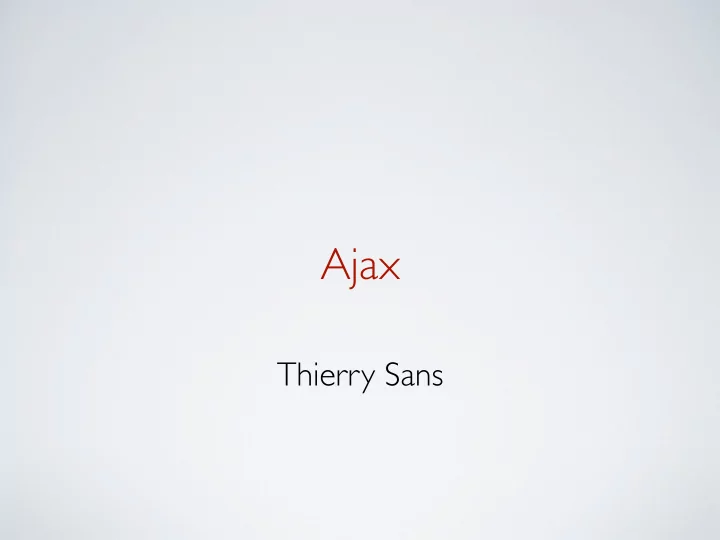

Ajax Thierry Sans
Ajax - fetching data without refreshing the page id=scACRSm... Ajax anything Javascript
Why do we need Ajax? So far, when we wanted to • send data to the server • or retrieve data from the server ๏ we had to refresh the entire page (i.e reloading HTML, CSS, JS and all media files) ✓ But, why not using Javascript to process the data and perform the necessary page changes?
Ajax - Asynchronous Javascript And XML Fetch/push content from/to the server asynchronously i.e without having to refresh the page ๏ Ajax is not a language ✓ It is a simple Javascript command
History of Ajax • Patent from Microsoft (filled in 2000, granted in 2006) • XMLHTTP ActiveX control (Internet Explorer 5) • Adopted and adapted by Opera, Mozilla and Apple • XMLHttpRequest Javascript object (standard) • Before / After IE7 ๏ Different code for different browser (emergence of the javascript framework Prototype ) ✓ Javascript Object was adopted by IE7
Ajax revolutionized the Web ✓ Started with Gmail and Google Maps • Advantages • Low latency • Rich interactions • Consequences • Webapp center of gravity moved to the client side • Javascript engine performance race
Standard Ajax var xhr = new XMLHttpRequest(); xhr.onload = function (){ if (xhr.status !== 200) console.error("[" + xhr.status + "]" + xhr.responseText); else console.log(xhr.responseText); }; xhr.setRequestHeader(key, value); xhr.open(method, url, true ); xhr.send(body); (always) asynchronous
Concurrency issue in Ajax - a typical example initialization var result = "" asynchronous var xhr = new XMLHttpRequest(); xhr.onload = function (){ assignment result = xhr.responseText; } xhr.open(method, url, true ); xhr.send(body); access document.getElementById.innerHTML = result; result will either be "" or “Hello world” depending on the program and the execution context ➡ Race Condition!
Recommend
More recommend